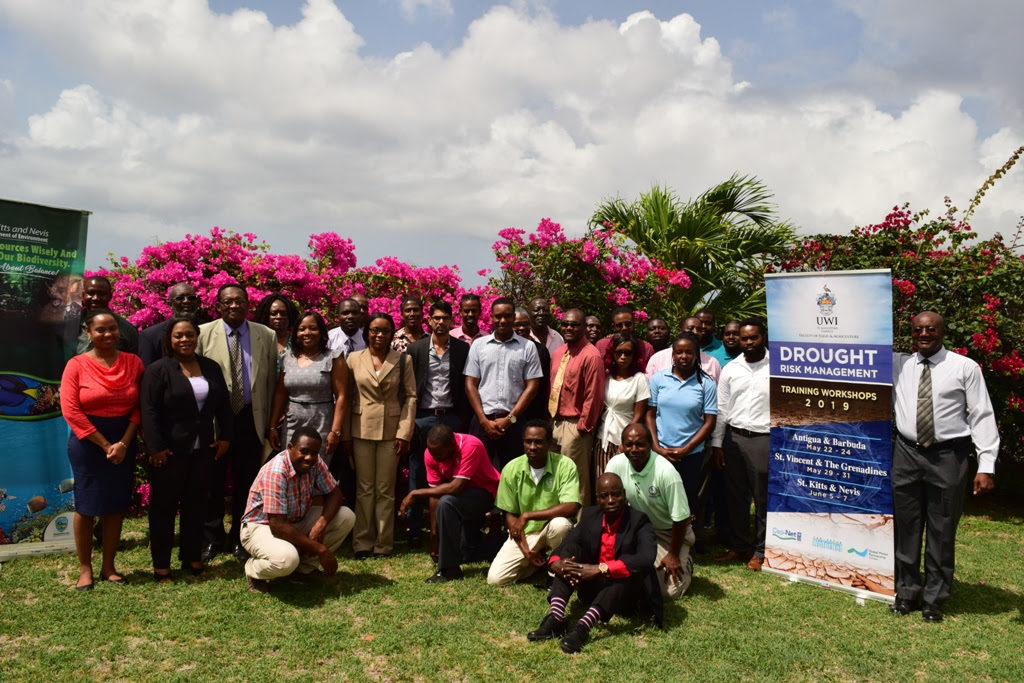Basseterre, St. Kitts, June 05, 2019 (SKNIS): Several key personnel representing specific agencies throughout St. Kitts and Nevis who are directly involved in water resource management are currently attending a Drought Risk Management Workshop at Manhattan Gardens in Lime Kiln, Basseterre.
The training workshop, which runs from June 05-07, is intended to increase participants’ understanding regarding droughts and the associated risks, as well as inform management and mitigation plans and policies. It is expected to enhance their knowledge pertaining to drought risk management and by extension increase our capacity to cope with and manage drought and drought like conditions.
Minister of Agriculture and the Environment, the Honourable Eugene Hamilton, delivered brief remarks at the opening ceremony on Wednesday, June 05, describing the training workshop as very important and timely.
“It is coming at a critical time, as we grapple with the increasingly prolonged dry periods of drought and drought-like conditions across not only the Federation, but the region,” said Minister Hamilton, adding that the current situation “threatens our food security and it also threatens our economic outlook if only because our agriculture which is the bread basket of a lot of people in this country, is based and driven primarily by water, water-fed resources.”
The minister applauded all those who have contributed and will contribute to the workshop and encouraged them to “take away learning to guide our mitigation efforts in response to the ever increasing challenges that we face caused by drought, and its associated risks, related to changes in our climate.”
He noted that his Government “is well aware that drought and drought-like events can hamper the country’s sustainable development pathway thrust” and encouraged one and all to play their part in ensuring that such a vital resource is properly handled.
“Therefore, as a country, but more importantly as individuals in this country, we must all strive to do our part collectively and individually. We must conserve, conserve, conserve. Without water, all life will become extinct. So, I repeat, conserve, conserve, conserve. Conserve as individuals and become engaged in the conversation so that decision makers in both the public and private sectors will be even more alert to the concerns and respond robustly to institute and ensure sustained mitigation methodologies,” said Minister Hamilton
Cheryl Jeffers, Conservation Officer in the Department of Environment, described the training session as one that can be viewed as a vehicle for building resilience in sectors such as agriculture, tourism, health and water services.
“I firmly believe that as we empower our people, we can become agents of change,” she said.
The workshop is organized by the Department of Environment and the Global Water Partnership – Caribbean in collaboration with CapNet UNDP-Caribbean and Faculty of Food and Agriculture (University of the West Indies, St. Augustine). Sectors such as agriculture, water, tourism, health, physical planning, environment, meteorological services, Allied Agencies with Agriculture (IICA and CARDI) and the Department of Cooperatives are all participating in the training session.
Simone Lewis serves as the regional coordinator for the Global Water Partnership – Caribbean. The facilitators are Professor Jacob Opadeyi from the Department of Geomatics Engineering and Land Management; Dr. Mark Wuddivira, Department of Food Production, and Dr. Ronald Roopnarine, Department of Food Productions, all from the University of the West Indies, St. Augustine Campus.



